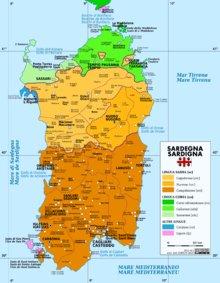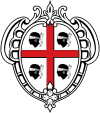Gallurese dialect
| Gallurese | |
|---|---|
| Gadduresu | |
| Native to | Italy |
| Region | Gallura, northeastern Sardinia |
|
Native speakers
|
unknown (100,000 cited 1993)[1] |
| Official status | |
|
Recognised minority
language in |
Sardinia (Italy)
|
| Regulated by | No official regulation |
| Language codes | |
| ISO 639-3 | sdn |
| Glottolog | gall1276[2] |
| Linguasphere | 51-AAA-pd |

Languages and dialects of Sardinia
|
|
Gallurese (gadduresu) is an Italo-Dalmatian Romance lect spoken in the region of Gallura, in the northeastern part of Sardinia. It is often considered a dialect of Corsican, or even a transitional variety between Corsican and Sardinian.
Gallurese's grammatical structure, pronunciation, and vocabulary are close to those of Corsican, in particular with the southern dialects of Sartene and Porto-Vecchio. A substantial part of Gallurese vocabulary is also shared with the Logudorese variety of Sardinian.
The Sassarese language, spoken in the area of Sassari, also shares similar transitional characteristics between Corsican, Tuscan, and Sardinian.
Contents
Typical constitutional elements of Gallurese
- the plural form of nouns in -i (ghjanni or polti 'doors') like in Corsican and Italian, and not in -s like in Sardinian (jannas, portas), French, Spanish, Catalan, etc.
- Latin 'll' has become -dd- (like casteddu, coraddu 'castle', 'coral'), the same as in Sardinian, southern Corsican and Sicilian (but castellu, corallu in northern Corsican);
- -r- modified to -l- (poltu 'port', while portu in Corsican and Sardinian);
- -chj- and -ghj- sounds (ghjesgia 'church', occhji 'eyes'), like in Corsican, while Sardinian is cresia, ogros.
- articles lu, la, li, like in ancient Corsican dialects (u, a, i in modern Corsican, su, sa, sos, sas in Sardinian);
Relation to Corsican
Gallurese is classified by some linguists as a dialect of Corsican,[3][4][5] and by others as a dialect of Sardinian.[6] In any case, a great deal of similarity exists between Southern Corsican dialects and Gallurese, while there is relatively more distance from the neighbouring Sardinian varieties.
The Regional Government of Sardinia has recognized Gallurese, along with Sassarese as separate languages, distinct from Sardinian.[7]
Sample of text
An excerpt from a hymn dedicated to the Virgin Mary.[8]
| Gallurese | Sassarese | Southern Corsican | Logudorese Sardinian | Standard Italian | English translation |
|---|---|---|---|---|---|
|
Tu sei nata par incantu Sei bedda chi dugna cori E socu vecchju canutu Cantu campu decu fà La Patrona di Gaddura |
Tu sei nadda pà incantu Sei bedda chi dugna cori E soggu vecciu canuddu Cantu campu aggiu da fà La Patrona di Gaddura |
Tu sè nata par incantu Sè bedda chì ugni cori Ié socu vechju canutu Quantu campu devu fà A Patrona di Gaddura |
Tue ses naschida pro incantu Ses bella gai chi dontzi coro E soe betzu e pili canu Pro cantu bivo appo a fàghere Sa patrona de Gallura |
Tu sei nata per incanto Sei tanto bella che ogni cuore Io sono vecchio e canuto Quanto campi devo fare La patrona di Gallura |
You were born from bliss You are so pretty that each heart I am old and bald No matter how long should I walk The Patron of Gallura |
History
The most ancient literary sources in Gallurese date back to the early 17th century, mainly as poetry and religious odes. Some late Middle Age fragments suggest that the formation of the language could be dated to the early 15th century. The origin and the development of Gallurese are debated. Max Leopold Wagner and Maurice Le Lannou argued that successive migration waves from Southern Corsica, promoted under the Aragonese rule to repopulate an area devastated by famine an pandemies, were crucial in the formation of a slightly hybridized version of Corsican.
See also
References
- ↑ Gallurese at Ethnologue (18th ed., 2015)
- ↑ Lua error in package.lua at line 80: module 'strict' not found.
- ↑ Blasco Ferrer 1984: 180–186, 200
- ↑ Contini 1987: 1°, 500–503
- ↑ Dettori 2002
- ↑ Loporcaro 2009: 159–167
- ↑ Lua error in package.lua at line 80: module 'strict' not found.
- ↑ Lua error in package.lua at line 80: module 'strict' not found.
External links
- http://interromania.free.fr/media/pdf/maxia/studii_storici_sui_dialetti_della_sardegna.pdf
- http://web.tiscali.it/consultagallurese/index.html
- http://web.tiscali.it/consultagallurese/attivita.htm
- http://www.uniud.it/cip/min_tutelate_scheda.htm
- http://eiha.crs4.it/cultura/opereWord/lingua/lingua.doc
- Walther von WARTBURG "La fragmentation linguistique de la Romania", Paris, Librairie C. Klincksieck, 1967.

